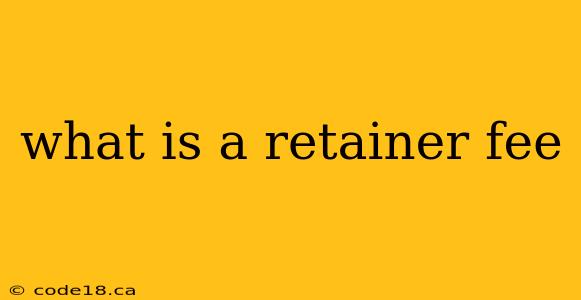Meta Description: Unlock the mystery of retainer fees! Learn what they are, how they work, the pros and cons, when to use them, and how they differ from project-based fees. This comprehensive guide clarifies everything you need to know about retainer agreements for smoother client-professional relationships.
Introduction:
Understanding retainer fees is crucial for both businesses and clients. A retainer fee is a pre-paid fee that secures a professional's services for a set period. This article will explore retainer fees in detail, examining their benefits and drawbacks. We'll help you decide if a retainer arrangement is right for you.
What Exactly is a Retainer Fee?
A retainer fee is an upfront payment that guarantees a professional's availability and services for an agreed-upon period. Think of it as reserving their time and expertise. The fee covers a certain amount of work or a specific number of hours. This differs significantly from project-based fees, where payment is tied to specific deliverables.
How Do Retainer Fees Work?
The specifics of a retainer agreement vary, but generally include:
- The Scope of Work: Clearly defines the services included within the retainer.
- The Retainer Amount: The upfront payment to secure the professional's time.
- The Retainer Period: The duration for which the retainer is valid (e.g., monthly, quarterly, annually).
- Payment Terms: Details on payment schedules and methods.
- Overages: How additional work beyond the retainer agreement will be handled.
How are Retainer Fees Different from Project-Based Fees?
| Feature | Retainer Fee | Project-Based Fee |
|---|---|---|
| Payment | Upfront, for a set period | Upon completion of a specific project |
| Work Scope | Ongoing, predictable amount of work | Defined by the project's deliverables |
| Client Access | Easier and quicker access to the professional | Access limited to project milestones |
| Best for | Ongoing support, predictable workload | One-off projects with clearly defined scope |
Advantages of Using a Retainer Fee Structure
- Guaranteed Availability: Secures the professional's time and expertise, ensuring priority access.
- Predictable Budgeting: Allows clients to budget more effectively knowing their professional costs.
- Stronger Client-Professional Relationship: Fosters ongoing communication and collaboration.
- Reduced Administrative Costs: Simplifies billing and reduces paperwork compared to project-based fees.
- Priority Service: Clients often receive prioritized attention compared to those paying per project.
Disadvantages of Using a Retainer Fee
- Upfront Costs: Can be a significant financial commitment, especially for smaller businesses.
- Unused Time: If the client doesn't fully utilize the agreed-upon hours, they may feel they've overpaid.
- Potential for Scope Creep: Defining the scope of work meticulously is essential to avoid disagreements.
- Lack of Flexibility: Adjusting the services included can be more challenging than with project-based fees.
- Not Suitable for All Projects: Not ideal for one-off projects with clearly defined scope and completion.
Who Benefits Most From Retainer Fees?
Retainer agreements are particularly beneficial for:
- Businesses needing ongoing marketing support: SEO, social media management, content creation.
- Startups requiring consistent guidance: Legal, financial, or business development assistance.
- Companies needing regular design work: Website updates, graphic design, branding maintenance.
- Clients who value consistent access and prioritized service.
How to Determine if a Retainer is Right for You
Before agreeing to a retainer, carefully consider:
- Your Budget: Can you comfortably afford the upfront payment?
- Your Needs: Do you require ongoing support or just one-time services?
- The Professional's Expertise: Are they the right fit for your long-term needs?
- The Terms of the Agreement: Understand the scope, payment, and overage policies.
Conclusion:
Retainer fees offer a structured approach to securing professional services. By understanding their advantages and disadvantages, and carefully evaluating your needs, you can make an informed decision. A well-defined retainer agreement can lead to a smoother, more productive client-professional relationship, ultimately benefiting both parties involved. Remember to always seek legal counsel when drafting or reviewing a retainer agreement.
